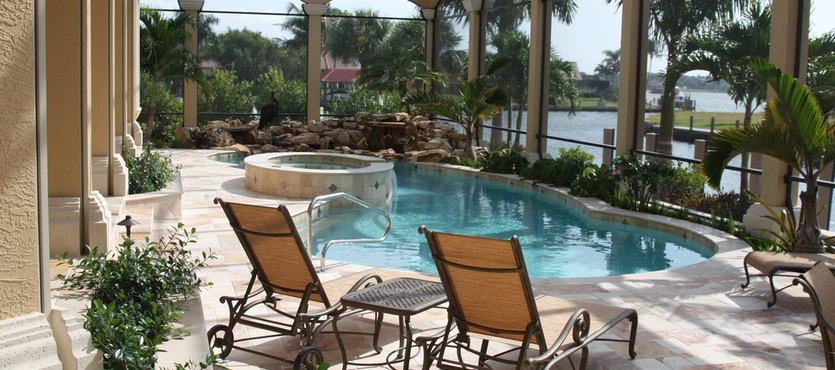We are here to break down the facts about salt water pools in South Florida – for one, they aren’t chlorine-free, and secondly, they aren’t that salty. Keep reading to learn more interesting facts about salt water pools.
Instead of dumping straight chlorine into your pool, a salt water pool uses salt in the water to naturally generate chlorine. A chlorine generator is used to process water through an electronic cell, which in turn produces sodium hypochlorite or liquid chlorine.
7 Facts About Salt Water Pools
#1. Salt Water Pools Still Contain Chlorine
Many people assume that a salt water pool contains no chlorine at all, but it does contain chlorine, it is just produced in a more natural manner and chlorine levels are lower as a result. Instead, a salt-water pool naturally generates chlorine.
#2. It’s Not That Salty
Another common misconception is that your pool water will be as salty as the ocean, not even close! While ocean water has a salt content of around 35,000 ppm (parts per million), the average salt water pool contains just 3000 to 4000 ppm. That’s a HUGE difference.
The salinity in a salt water pool is so mild that most people will never know it’s there. The salinity is close to what is found on human skin, which gives the water a softer feel. It can even make your skin feel softer upon getting out of the water.
#3. How a Salt Water Pool Works
There is a control unit and a salt cell, the control unit regulates the amount of power supplied to the salt cell. Chlorine is created when power is supplied to the cell. There is usually a power knob on the unit that’ll control how much power goes to the cell. Turning the knob up will generate more power for a longer period of time. When the pump is on, salt water flows through the cell and generates a process known as electrolysis, in which salt is converted into chlorine.
The size of your pool will determine how much salt you need to add to the water. In addition, the salt chlorine generator installed on your pool will also determine how much salt to use. You can find info about this in the owner’s manual. On average, it typically ranges around 3,000 to 4,000 ppm.
#4. Prevents Negative Drawbacks of Chlorine
Chlorine is a great asset when it comes to fighting off much of the bacteria that can linger in your pool and make people sick, but there are some negative drawbacks to a pool that relies on straight chlorine. Most of these drawbacks can be avoided with a salt water pool, while still enjoying the benefits of chlorine.
Benefits of salt water pools:
- A salt water pool does not have the same obnoxious chlorine smell
- It is easier on the skin and eyes – leading to less irritation
- It can leave your skin feeling softer
- You don’t have to store, handle, or transport chlorine
#5. Some Chemicals Are Still Necessary
Salt water pools still require the use of some chemicals to properly function. Although, pretty much all that you need is chlorine pucks. From there, it’s still important to make sure that pool water is balanced to prevent damaging pool equipment or making your water uncomfortable to swim in. Shock may be added from time to time to prevent a buildup of organic waste and to release available chlorine in the water.
#6. Proper Maintenance Will Help Your Salt Chlorinator Last Longer
While the average salt cells used in a residential salt water pool will last around 10,000 hours of operation, or around three to five years, there are things you can do to ensure it lasts as long as possible. One of these things is to keep up with proper pool maintenance, which includes checking salt levels and water chemistry on a regular basis.
#7. You Can Convert Any Pool into a Salt Water Pool
You don’t need to install a brand-new pool to enjoy the benefits of a salt water pool. Any pool can be converted into a salt water pool. All you need to do is have a salt water chlorine system installed to your existing pool.
At Pools by Signature, we specialize in salt water pools. Learn more about installing a salt water pool in South Florida.

